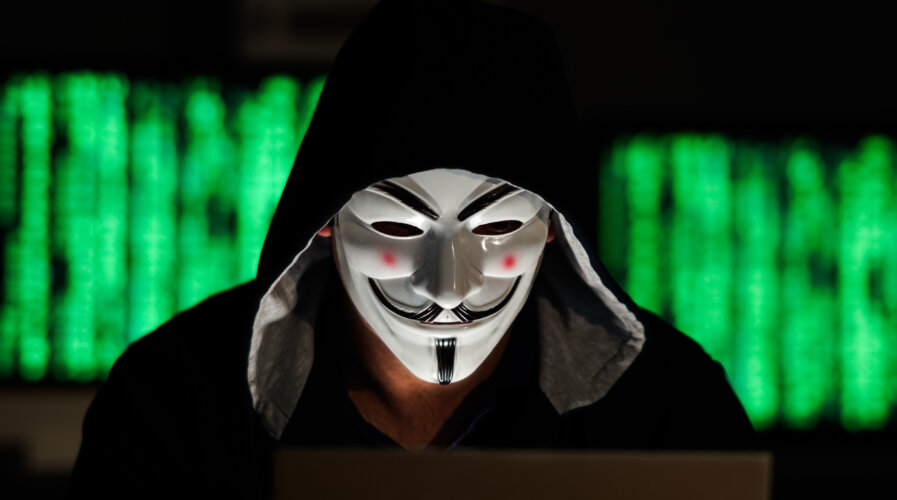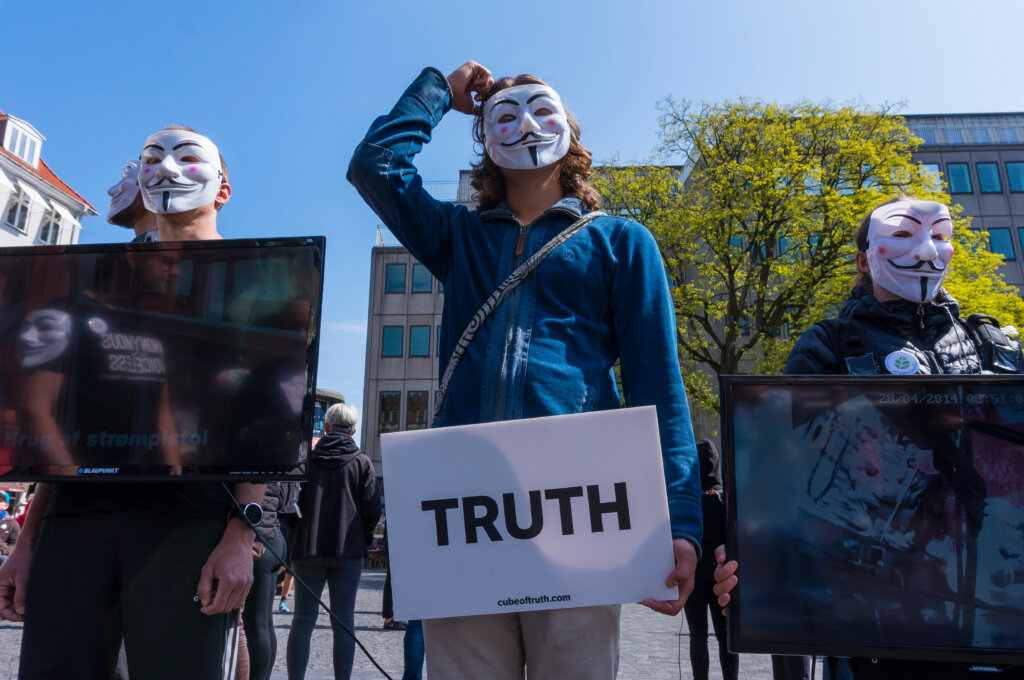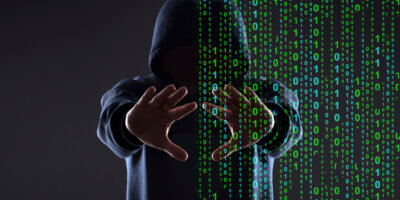
Who is the Anonymous hacker group actually? (Source – Shutterstock)
Who is really behind the Anonymous hacker group?
- Anonymous is a global hacker group known for online protests and has faced legal action due to their activities.
- Their notable events, such as attacks on the Church of Scientology and Russia, often cause controversy due to data leaks and vague political agendas.
- Views on Anonymous vary, reflecting larger debates on internet freedom and privacy.
The hacker collective Anonymous is an informal, worldwide network of hackers and activists. It garnered global attention in the mid-2000s. Notorious for its internet-driven protests, advocacy, and direct action, the Anonymous hacker group is often seen targeting government bodies, corporations, and other organizations.
Hiding their identities behind Guy Fawkes masks, the group owes its origins to the imageboard 4chan. Known for its anonymity and uncensored content, the idea of users posting without names was soon dubbed as ‘Anonymous’. What started as a simple meme morphed into a shared identity for users involved in internet culture activities and online pranks.
The image of Fawkes was used as it represents a symbol of revolutionary protest that has grown throughout the 21st century. Members of the Occupy movement wore similar masks during the global anti-capitalism protests around 2010.
Major events and evolution
One of the earliest and most striking acts by Anonymous took place in 2008 with Project Chanology, a protest against the Church of Scientology’s attempts to remove a Tom Cruise video discussing Scientology from the internet. Actions ranged from DDoS attacks to prank calls and in-person protests, drawing considerable attention to Anonymous.
Anonymous has grown and evolved from a group mainly focused on pranks to a collective participating in significant social and political movements. However, due to its decentralized structure, the group’s lack of hierarchy and leadership allows for a diverse and sometimes contradictory existence. Individuals or sub-groups often pursue their agendas under the Anonymous banner.
In a significant event in 2022, Anonymous responded to Russia’s invasion of Ukraine by launching extensive ‘cyber operations’ against Russia. They hacked state-run outlets, disrupted the operations of the Russian space agency, Roscosmos, and attacked a yacht linked to Vladimir Putin. Their efforts targeted over 2,500 Russian and Belarusian entities, including government agencies, state media outlets, and major banks.
In retaliation to Russia’s seizure of Ukraine’s Zaporizhia Nuclear Power Plant, Anonymous targeted Rosatom, the state atomic energy corporation’s website. They procured gigabytes of data for public leaks and used Russian printers to disseminate anti-propaganda messages.
Anonymous has released considerable amounts of data, including a 446 GB leak from the Russian Ministry of Culture and several emails from Russian companies, shared with the whistleblower group, Distributed Denial of Secrets.
Their protests also extend to issues like Australia’s offshore detention of refugees, leading to the leak of 82GB of Australian police emails.
In 2022, Anonymous caused significant disruptions to Russian operations, including bringing down the video-hosting site RuTube on Russia’s Victory Day and extracting 10.5 terabytes of sensitive data from Russian payment processor Qiwi.
The group consistently targeted Russian companies, leaking their emails. One member reportedly stole warfare drone tactics from a Russian military company. In a notable incident in September 2022, Anonymous claimed responsibility for a significant traffic disruption by hacking Yandex Taxi and directing numerous cars to a single location.
It’s crucial to remember that Anonymous’s actions often involve illegal activities like hacking or DDoS attacks, leading to law enforcement actions and arrests of suspected members.
Collectively, Anonymous embodies a new form of digital, decentralized activism, representing the potential, intricacies, and disputes inherent to online protest in the 21st century.
Controversies and criticisms surrounding Anonymous hacker group
The group’s methods, particularly their “hacktivism,” which blends hacking and activism, have been controversial. Actions like their Distributed Denial of Service (DDoS) attacks, resulting in substantial data leaks, website shutdowns, and other disruptions, are viewed as illegal cyberattacks by some, while others see them as valid forms of protest.
Anonymous faces criticism on multiple fronts. Unintended consequences of their operations, such as unfiltered data leaks that expose innocent individuals, have been pointed out. The group’s lack of a unified political agenda and decentralized nature, which allows anyone to act under its name, is also a subject of criticism. The absence of a central command often leads to inconsistent actions with varying intents and impacts.
Public perception – Cyber crusaders or cybercriminals?
Perceptions of Anonymous are mixed. While some hail them as internet vigilantes or digital freedom fighters due to their stand against perceived injustice and their defiance of powerful entities, others, particularly law enforcement and corporate entities, label them as cybercriminals. Critics argue that their tactics, including DDoS attacks, hacking, and doxing (releasing private information online), are unlawful and could infringe upon privacy rights.

Is the Anonymous hacker group comprised of internet vigilantes or cybercriminals? (Source – Shutterstock)
The debate surrounding Anonymous reflects more significant discussions about internet freedom, privacy, and the ethical use of digital tools in achieving political and social objectives. It’s worth noting that given the decentralized nature of Anonymous, the actions and views of individuals or sub-groups may not accurately represent the collective as a whole.
Looking to the future, it’s likely Anonymous will continue to adapt and evolve to the changing technological landscape. As long as perceived injustices continue in the world, the ideological foundation of the group will continue to attract individuals with the skills and motivation to conduct these types of activities.
In conclusion, while Anonymous’ specific future actions may be brutal to predict due to its decentralized and fluid nature, its enduring presence in cyberactivism appears certain. The collective, in one form or another, will likely continue to engage in digital protests and cyberattacks aligned with their core principles.
READ MORE
- Strategies for Democratizing GenAI
- The criticality of endpoint management in cybersecurity and operations
- Ethical AI: The renewed importance of safeguarding data and customer privacy in Generative AI applications
- How Japan balances AI-driven opportunities with cybersecurity needs
- Deploying SASE: Benchmarking your approach


